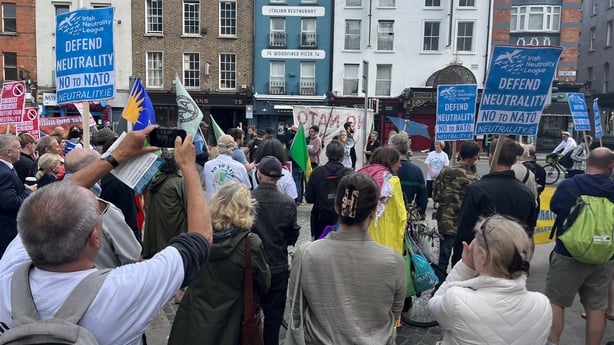The Taoiseach has identified cyber security, international terrorism and threats on infrastructure as three areas where Ireland could engage further with PESCO - the defence cooperation entity of the European Union.
Speaking at the Consultative Forum on International Security Policy, Leo Varadkar said that Ireland would sign up to such projects on a case-by-case basis and in line with the country's policy of military neutrality.
Asked about suggestions of a referendum ruling out the possibility of Ireland joining NATO, he replied: "I have never heard of the idea of having a referendum on not joining an organisation."
The Taoiseach added that "it's not the intention" of this Government, or any of the three individual parties that make up the coalition, to join a military alliance - including NATO.
He said Ireland has a very active international foreign policy, which is bolstered by an Overseas Development Aid budget of more than €1 billion.
The forum has been focusing on the experiences of Norway, a founding member of NATO, and Switzerland, which has a policy of armed neutrality.
Joachim Adler, from the Swiss Federal Department for Defence, said that not being a NATO member had been of assistance to his country, particularly when it came to dialogue with Serbs.
However, he said this absolutely depended on the context of any engagement Switzerland made.
Ine Eriksen Søreide, Chair of the Norwegian Standing Committee on Foreign Affairs and Defence, said her country was impartial but not neutral.
She detailed how Norway was engaged in Afghanistan while, at the same time, had contact with the Taliban for 20 years.
Ms Eriksen Søreide said her country was viewed as a credible partner because her country was in "for the long haul".
This was down to the fact that while governments may come and go in Oslo, the foreign policy of the State did not change.
Read more:
What is the Consultative Forum on International Security Policy?
Two forum panelists give their views on three key questions
'Relentless campaign' to associate with NATO
People Before Profit Deputy Richard Boyd Barrett accused the Government of engaging in a "relentless campaign" to associate Ireland with NATO.
Dublin MEP Clare Daly claimed the forum is a con to try and get rid of Ireland's 'Triple Lock'.
She said the only reason the 'Triple Lock' is not fit for purpose is because people at the forum want to send troops abroad on missions that do not have a UN mandate, like Iraq.
The 'Triple Lock' requires that in order to deploy more than 12 Irish troops for peacekeeping or European Union missions, the mission must have the approval of the Government, the Dáil and the backing of a UN resolution.
If this was to be removed, a future Irish Government would have the ability to make such a deployment decision, providing they could convince the cabinet and then command a majority in the Dáil.

Ireland participates in the EU’s Common Security and Defence Policy (CSDP) on the basis that it does not impinge on our traditional policy of military neutrality.
The aim of the CSDP is to create the capacity to undertake peacekeeping and conflict prevention missions, and to strengthen international security, in accordance with the principles of the UN Charter.
The forum will consider Ireland's future engagement with the CSDP, as well as Partnership for Peace - where countries cooperate with NATO on agreed objectives.
Delegates will later hear from representatives from Sweden and Finland who have changed their security and defence policies, and applied for NATO membership on account of Russia's invasion of Ukraine.
Critics of the forum say the views of countries such as Malta should have been included - a country which has neutrality enshrined in its constitution, and defines it as actively pursuing peace, security and social progress by adhering to non-alignment and refusing to participate in any military alliance.
Earlier, Mr Varadkar spoke out against a "small minority" who have weaponised the Irish flag on social media and at protests on the street.
He said they have tried to use it as a badge of identity, and to exclude others.
The Taoiseach said the flag does not represent one group but represents "all of us" - peoples' values, aspirations, homes and dreams.
He said the flag stands for the best of us.
Mr Varadkar said a small violent and undemocratic group had tried in the past to adopt it as their banner but failed to defile it.
He said the current minority would fail too.
A protest took place outside Dublin Castle where the forum is being held.







